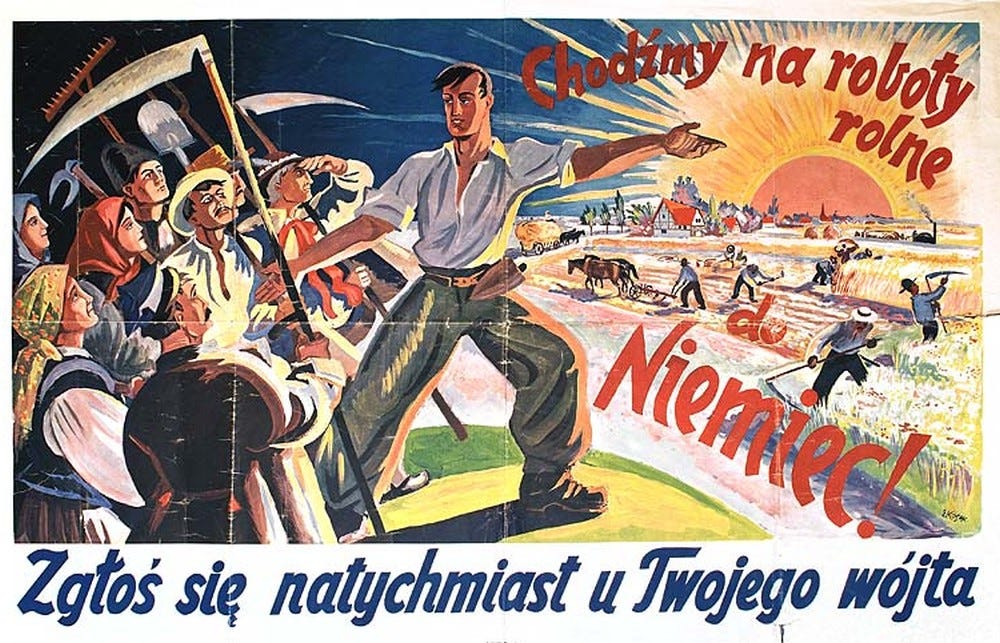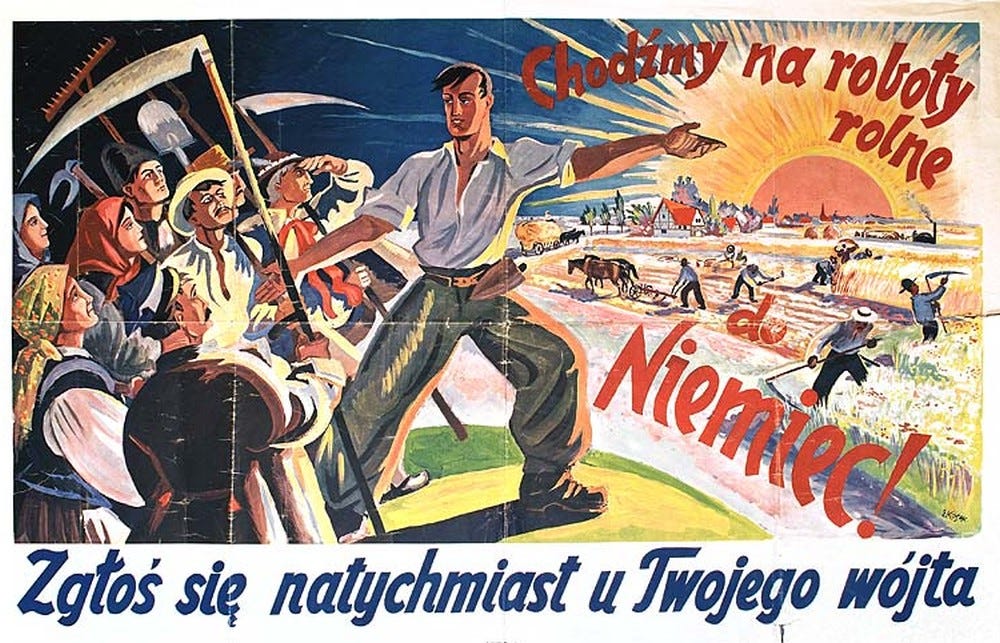The Great Replacement is National Socialism
The Real Anti-Fascists Are Against Illegal Immigration
We view the “Great Replacement”, the ideological drive to replace the native populations of the West with mass amounts of immigrants “legal” or otherwise but always from elsewhere as a left wing project and imperative. And of course we see the National Socialist government of Germany as having been an opposing kind of project, at its core a right wing nativist, anti-immigration project.
There are other ways of looking at the National Socialist program, of course, but that’s the basic framing most of us accept.
The National Socialist killings of all kinds of groups who weren’t ethnically German seem to make the point indubitably obvious: Nazism was a right wing project to eliminate all the “lower” kinds of people from Germany—and, ultimately, from Europe, making way for an expanded Germany for the Germans. Mass immigration today, on the other hand, while pushed by the tech-right for its own reasons, is mostly portrayed and voted for by the political left as a moralistic, “compassionate” project.
According to the left, anyone who opposes mass immigration in Europe or the United States has, since World War II, been pointed as somewhere along a mythically ever-present slippery slope toward the mass graves, death camps, tanks rolling across borders, and V2 rockets flying into them. Conservatives who oppose immigration may quibble over Nazism was left or right wing, but they buy this model on some level, merely objecting that we’re opposed to immigration but “not in that way.”1
But what if I told you that the leftist urge to flood the West with immigrants bears far more alignment to Nazism than you might have realized? The Great Replacement in the West over the last generation isn’t a “compassionate” project but is part of the same sort of economic system that National Socialist Germany was evolving into during World War II with the Nazi project. Their project, in the end, actually ended up creating a “great replacement” of the German people even as it touted being about Germany for the Germans. Crucially, the Great Replacement today is not a compassionate project, but is the putting into place of a “national socialism” for the elites.
But what was—and still is—the essence of National Socialism?
Nicholas Stargardt's The German War: A Nation Under Arms, 1939-1945 helps us understand the ideology and the economic system it created by illuminating the understudied point of how the German people themselves felt about National Socialism and World War II in Europe.
The Beneficiaries of National Socialist “Mass Migration”
Throughout his book, based on the personal letters and correspondence of ordinary Germans, Stargardt points out the oddity, oft forgotten, that while the Germans clearly killed millions and millions in the conquered territories, especially in the East, they enslaved far more people to work for the German war effort, industrial production, agriculture, and even service industries than they killed. These people, Poles, Russians, Czechoslovaks, French, and yes, even Jews worked in the conquered territories as well as in high numbers (between 8 and 12 million) within Germany proper.2 In proportion to the size of Germany’s population in 1943, they numbered as if America took in 30-45 million immigrant workers today!3
These foreigners are separate from the millions of prisoners who worked in the concentration camps and secret rocket factories, generally hidden from view of the German population. Foreign workers, by contrast, were everywhere, worked everywhere, and were highly visible, and it perturbed the German people through the ironic discombobulation it sometimes provided to surface level Nazi ideology. These foreigners were sometimes conscripted, but often just purely encouraged to come to Germany with posters like this one:

According to Stargardt, they were crucial to keeping Germany going:
For a regime which focused on national — and racial — purity, there was much greater reluctance to see Poles working and living in German cities, even though the armaments industry was so desperately short of labour that many factories depended on the Wehrmacht releasing skilled workers after the French campaign in order to keep going.4 (139)
Rather than emptying Germany of non-Germans, paradoxically, as the war dragged on, the Nazis cajoled more and more non-Germans into Germany, further inverting seeming Nazi aims:
There were other reasons why the Nazi empire was not a popular idea. Germany was now awash with foreigners. With much of the Nazi propaganda on racial purity pandering to a narrow sense of national, or even local, identity, the influx of foreign workers could at best be tolerated as a wartime expedient, a rational but unpleasant necessity. At the same time, many domestic ills were blamed on the disruption caused by foreigners, who, it was conveniently forgotten, had been press-ganged.5
For Ursula von Kardoff, a journalist at Berlin’s Deutsche Allgemeine Zeitung, the issue with mass immigration wasn’t just the small disruptions or discordance with party ideology or the German desire for revenge over their foreign enemies, but the risk of revolt from the foreigners themselves:
On a walk through the long underground passages of Berlin’s Friedrichstrasse station, Ursula von Kardoff was fascinated and scared by the polyglot world of foreign workers she saw in this ‘Berlin Shanghai’. As young men with bright scarves and long hair laughed and sang, bartered and traded with one another in the large beer halls, she remembered the rumors she had heard about their secret weapons caches. ‘Twelve million foreign workers in Germany,’ she mused, inflating the real figure by 50 per cent. ‘An army in itself. Some call them the Trojan Horse of this war.’6
We’ve heard—and probably share similar thoughts today about the tens of millions of illegal immigrants in the United States and the risk they pose to America, especially if they’re crossing our borders at the behest of our foreign adversaries.
But how did this fit with Nazi ideology? And what was the end goal of the system, if it ended up making Germany less German?
But what was National Socialism?
The reason for such mass importations of foreign workers is blatantly obvious: work. The Nazi aim, “Importing cheap foreign labor on a large scale”7 sounds exactly like the recent behavior of the U.S. and European political establishments.
The way it fit with the ideology is also simple.
Like most ideologies and regimes, National Socialism itself had an inner reality and an external marketing brand.
It was marketed to Germans a a promise to make all Germans matter again and be equally recognized before the state and before other nations. Equal burdens and equal rewards were promised to all true Germans was the promise of the social contract. Of course during the war this devolved to a competition amidst Germans for the title of “most oppressed” or “most burdened” the same way as our politics often devolve into a “woke” debate about which group is most oppressed.
But the inner reality differed significantly from the marketing. Rather than being socialism for the German nation, equality amidst people of a single race, as William Shirer amidst many others point out in The Rise and Fall of the Third Reich, national socialism in practice, while preaching that it was for all the Germans, in practice benefitted the elites and owners of capital. The elites, in the name of national socialism, could expect to see any rebellion amidst their worker’s suppressed, wages kept low, and ultimately, when worse came to worst in the middle of the war, protection and special benefits for them, free or extremely low cost imported labor, and, once again, no trouble from the nativist Germans.
There were differing view within Hitler’s inner circle, of course. Some were hard core racialists who wanted to merely kill those of a lower racial caste whilst others, more pragmatic, merely wanted to use and abuse them for the benefit of the German “national community,”8 especially the elite interests and business owners at the top of the system.
But the end result, Stargardt points out, has the Germans themselves among the biggest victims of National Socialism. While the foreign workers benefited the Germans in the short term with drawbacks, ironically, by the end of the war the practice was leading to a more-diverse, less German Germany whilst millions of German men suffered and died in a foreign wasteland none of them wanted to move in to. In the end, the greatest victims of Adolf Hitler and Nazism were the Germans themselves, a point made even stronger by Hitler’s decision at the end of the war to give up on the German people and continue the war for pretty much pride’s sake alone:
The two men [Albert Speer & Hitler] met the same day, with Hitler asserting that the war would continue and the army would wage a ‘scorched earth’ policy without regard to Germany’s future need: If the war is lost, then the people too is lost.’ If the German people proved too weak, he declared, then the ‘future belonged to the stronger people of the east’.9
Ironically further, as the war dragged on and few Germans were willing to “colonize” the East, Nazi doctrine having decried “colonialism” as British or Judeo-British barbarism and individual Germans fearing to live in the risky lands near the front lines, Nazi policy on who counted as “German” changed.
By the end of the war, official propaganda was even talking about “Europeans” uniting against Judeo-Bolshevism, etc. rather than merely talking about Aryans or Germans. German national socialism spoke of all racial Germans as national comrades, but the purpose of the policy was clearly elitist, hurting non-Germans more than Germans, but oppressing and utilizing all for elite interests. The German lords of industry, many of whom escaped after the war to join forces with the Office of Strategic Services (OSS), the forerunner of the U.S’s CIA as David Talbot explains in The Devil’s Chessboard or Paul Williams does in Operation Gladio, were in fact the real beneficiaries of National Socialism. National Socialism would up being socialism, yes, but socialism benefitting and dividing the spoils equally amidst the elites.
What is the U.S. System Today?
The ongoing Great Replacement today, while touted in terms of compassion10 is, practically speaking, no different than the National Socialist importation of foreign workers. Its ends are the same: “Importing cheap foreign labor on a large scale,” and perhaps secondarily, importing a more pliable and manageable, submissive citizenry for the elites to handle. Cheap labor is the primary purpose, primarily for the elites to enrich themselves at the expense of the rest of the country.
Of course we don’t press gang foreign workers, force them to migrate to America, and oppress them in low wage slave-like conditions once they arrive. The victims of todays Great Replacement are merely the American citizens, right?
Right… Right… (laughing)
Of course not:
From a certain perspective, albeit over a much more drawn out period of time, the U.S. ideological empire has destabilized, conquered, couped, recouped, reconquered, and terrorized the world, leaving millions of desperate people around the world ready to take the opportunity to migrate as second class citizens to America to serve the elite’s labor needs. Especially if government sponsored NGOs through USAID were aiding, pressing, and forcing them along to take opportunities working for the American elite once they arrive…
It’s almost like we’re doing the same thing as the National Socialists did with posters like this one:
Of course there are some systematic differences. The trick this time requires a sleight of hand of the government pretending to be opposed to immigration even as they actively encourage it in order to keep the immigrants, fearful, terrorized, and compliant subjects of the lords of industry when they arrive. But the end result is the same, a compliant slave class who can serve the titans of industry better and be used as a stick to beat down and divide the American citizens, as JD Vance told the story in this interview (timestamp 8:14) of a hotel magnate who was mad at Trump for taking away his slave underclass.
As was the case in National Socialist Germany, the immigrants, underpaid, easy to abuse, unrooted from their cultures and families, are victims. But so also, in both cases, are the people, the workers, of the countries they are brought into to replace also victims.
What’s the point?
The same “divide and conquer” utilitarian strategy is being used now as the German National Socialists did to the people they conquered. Similarly today, even though the United States’ defined borders as a nation state haven’t really grown in over a century, the United States, as Balaji Srinivasan amidst others likes to point out, is truly an ideological empire that has conquered and oppresses much of the world for the sake of the elite interests that profit from the bombs, boots, and streams of illegal immigrants making their way to the imperial center to become a slave underclass.
The moral, practical point of pointing this out is that the situation and state of illegal immigrants in the United States is a bad thing for the illegals themselves even as it’s also an obvious bad thing for the local American citizens who are being slowly replaced by the elites. Although arguably many of us benefit in a perverse way from the underclass slave-like labor of the underclass, we lose out to a greater degree from the moral corruption, loss of opportunities, and loss of a future that the system induces in us.
Due to the endless supply of “slave labor”, initiative and opportunities are taken away from Americans, who are morally corrupted by the system to devalue real work. The immigrants, while hardworking, are on the whole, less skilled and competent than native workers. An effect of this is today’s crisis in competency and our ability to actually get things done in the real world as pointed out by Patrick Collison in “Fast” and the general degradation in American living standards and mores since 1971. Our decline in technical capabilities is correlated with the general replacement of Americans by these poor substitute barbarians (to use a late-stage Roman Empire analogy) or victims from the imperial fringe. Perhaps the phenomenon of fake jobs for the imperial bureaucracy that David Graeber covers (in government as while as in big business) is merely a temporary solution by the elites to buy off those who might resist replacement?
The moral solution, of course, is that the United State stop giving away its birthright blowing up the rest of the world, stop creating crowds of refugee victims, and stop “allowing” them as an illegal underclass to be turned into slaves in the imperial center.
While we’re in some way beneficiaries, we’re all victims of the scam, which is, in more than one respect, illuminating of the fact that our political and economic system, is, and has been since World War II at its core, “elite national socialism” the same way as National Socialist Germany was. While the marketing is sometimes different, the beneficiaries of the system are the corporations, banksters, and government pawns of the banksters, and the victims are everyone else. Our system, yes, is, and has long been fascistic, big corporations and big government working together to screw over everyone else.
See
’s excellent summary of the same here:The native populations of the West are just starting to realize that it’s hurting them, their opportunities, and their future as peoples just about as much as it’s hurting the immigrants. But few politicians in power on either side of the aisle want the flow to stop because so many of them are in on the scam, personally benefitting from it, just as many Germans late in World War II were happy to have foreign workers doing a lot of the work for them.
In the long view of history, we’ll probably never completely escape corrupt elite influence, but as I’ll cover in forthcoming pieces on the Trump/Musk feud, we as people do better if we at least have alternatives to the corrupt elite, or if there are ways to localize, to fragment, the large corrupt imperial systems, as with one potential, hopeful future I cover here:
But let’s remember that the real anti-Fascists, the real anti-Nazis, are against illegal immigration.
I do oppose the framing even as I also think there are people on the right to be wary of, as with Nick Fuentes and his groyper clan:
Ulrich Herbert, “Forced Laborers in the Third Reich: An Overview”, Universitaet Freiburg: https://library.fes.de/libalt/journals/swetsfulltext/14895169.pdf
Eerily similar to the proportional size of the illegal immigrant population in the United States today.
Nicholas Stargardt, The German War: A Nation Under Arms, 1939-1945. New York: Basic Books, 2015, pg. 139.
Nicholas Stargardt, The German War, pg. 292-293.
Nicholas Stargardt, The German War, pg. 466.
Stephenson, Jill. “Triangle: Foreign Workers, German Civilians, and the Nazi Regime. War and Society in Württemberg, 1939-45.” German Studies Review, vol. 15, no. 2, 1992, pp. 339–59. JSTOR, https://doi.org/10.2307/1431170. Accessed 7 June 2025.
According to Stargardt, “national community” or “national solidarity” was a frequent marketing slogan in National Socialist propaganda towards Germans.
Nicholas Stargardt, The German War, pg. 508.
Well, on the surface level, its also touted as being a way of creating a glorious new American future free from bigotry, racism, right-wingism, religion, guns, and worries… We can’t say they aren’t being at least partially honest.

















